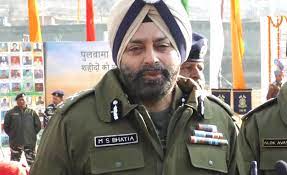Security agencies have started preparations for the upcoming assembly elections and the Amarnath Yatra in Jammu and Kashmir, a top Central Reserve Police Force (CRPF) official said on Tuesday.
CRPF inspector general (IG), Kashmir operations, MS Bhatia made these comments during his visit to Tral in south Kashmir to inaugurate a unit hospital under the Pradhan Mantri Jan Arogya Yojana. “Our endeavour will be to stay ashore, whether during the elections or the pilgrimage. Strict arrangements will be in place to ensure law, order and security,” he said.
All major parties in Jammu and Kashmir are hopeful of the Election Commission conducting assembly polls this summer, the first such exercise since the abrogation of Article 370 in August 2019 and bifurcation of the region into two union territories.
The groundwork for the elections is almost over with the completion of delimitation exercise and the publishing of final electoral rolls in October.
On May 5 last year, 43 seats were earmarked for the Jammu region and 47 for Kashmir, making a total of 90 seats for the assembly, up from previous 83 seats. Earlier, Jammu had 37 seats and Kashmir 46. The administration has already started reviewing arrangements for the annual Amarnath Yatra.
Last month, Kashmir divisional commissioner Vijay Kumar Bidhuri had convened a meeting of officers to make arrangements for the yatra.
Addressing the meeting on February 23, Kashmir divisional commissioner had directed deputy labour commissioner to initiate the process of registration of service providers, including transporters, labourers and others.
He had also instructed officers concerned of the animal husbandry department to initiate the simultaneous process of registration of animals, including ponies and horses. Bhiduri asked the officials to identify safe areas for positioning of tents at the base camps and near the holy cave.
On Monday, officials had said that RFID tags would to be made mandatory again this year for all pilgrims on the Amarnath Yatra. The authorities had first tested RFID tags in 2019 to track the movement of some pilgrims, and made it mandatory in 2022. The yatra could not be organised in 2020 and 2021 due to Covid.
Security agencies have also proposed to use more CCTV cameras on highways at sensitive areas and to increase security at the rest stops along the journey, officials aware of the discussions said.




